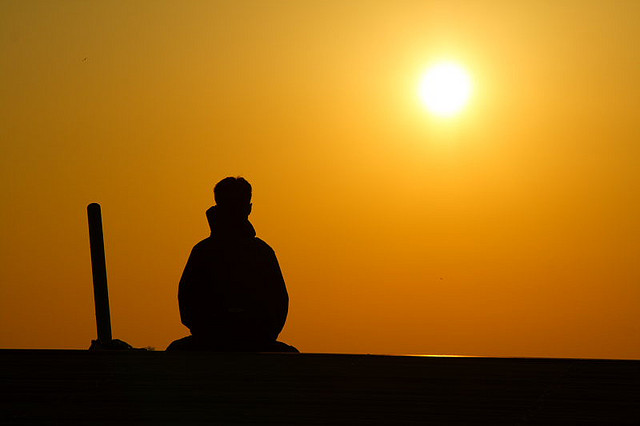
“Holding on to anger is like grasping a hot coal with the intent of throwing it at someone else; you are the one who gets burned.” ~Buddha
I have a confession: I’m mildly obsessed with anger.
Not the negative feelings, the volatile outbursts, or the fly-off-the-handle reactions, but rather how humans express anger.
I’ve largely made my living by dealing with various states of anger. More on that in a bit…
Years ago I was shopping at a bookstore with my friend Alex. We were first time parents with toddlers at home.
The idea was to find resources on how to raise emotionally healthy children and how to avoid the parenting mishaps we witnessed too often at work.
As school social workers, we provided family counseling to young children and wayward teens in the inner city.
As Alex obsessively scoured the aisles for the latest research-based writings on emotional intelligence, my eyes gravitated toward an entirely different topic.
The black, matte-textured book with the blood red title practically screamed at me: Hatred: The Psychological Descent into Violence.
I devoured it that night.
It’s not that I didn’t want my kid to learn to soothe himself when upset, to resist peer pressure, or to misread social cues. But in that moment I felt a stronger pull.
Part of the fascination stems from my ancestry; I’m half-Italian and half-Irish. A DNA hotbed, if you will.
Meals were eventful. When I would lose my cool at the dinner table, my dad would wildly gesticulate in my mom’s direction. She, in turn, would shrug and reply “It’s The Fighting Irish in her, I suppose.”
Additionally, I’m a psychotherapist who specializes in anxiety issues—generalized, panic, and social anxiety disorders.
Do you want to know the quickest way to get a handle on your anxiety? Get ahold of your anger.
I realize this may sound counter-intuitive. After all, we don’t normally associate anxious people with bad tempers and loud voices.
The anger management connection is not exactly linear.
It takes courage to express anger—to stand up for yourself and your values, which sometimes includes taking an unpopular stance.
Bravery is valiant, strong, and admirable, while anxiety is cowardly, weak, and anything but enviable.
Because many anxious people have a problem asserting themselves, feelings of helplessness, avoidance, and frustration take residence.
Compounding the issue is the fear that if you express anger, you might lose control.
And since many anxious individuals are people-pleasers and caretakers, these feelings are especially unwanted.
But feelings go somewhere.
And typically, when you take on too much responsibility, you inevitably feel exhausted, taken advantage of, and angry.
If you don’t have a firm grasp on your anger responses, you’re going to hold it in until it explodes, or you’re going to yell, scream, stomp your feet, and possibly say and do things you regret.
Then comes the guilt. And next, the overwhelming urge to fix the situation. And before you know it, the cycle repeats itself again.
All the while, you’re wasting precious emotional energy that could be better used on enjoyable tasks.
The good news is there’s strategies you can do today to help you feel more calm.
I included five common ways I help us go from anxiety to zen below:
1. List the places in your body where you feel anger.
Is it in your chest? What happens to your heart rate? How does your stomach feel?
It’s important to recognize the physical cues of anger in order to alert youself that it’s time to calm down.
2. Visualize different behavioral responses. How do you react when you feel angry?
Do you scream, tantrum, throw things, bottle it inside, or pretend that everything is fine?
Write down three different reactions you will do instead, such as:
Calmly assert your needs, deep breathing, count to ten, walk away rather than stick around for a fight, and close your eyes to reduce visual stimulation, etc.
3. Make friends with the word “no.”
Many nice people have a hard time with this one. The association with conflict makes us feel mean, insensitive, or too direct.
Know that “no” means you respect yourself, your time, and your values. Practice saying it in the mirror until it sounds deliberate and natural.
4. Ask yourself if you value expressing anger over getting along with others.
It’s a fact that some people enjoy the adrenaline rush of letting go and projecting their uncomfortable feelings onto others.
Recognize that the short-term feelings of power are no match for the sleeplessness, headaches, and despair, which endure long after the “anger high” wears off.
5. Think about the last time you got angry. How did you go from anger to a calmer place?
You’re probably really good at getting angry already, so let’s focus on the other side. Be specific. What behaviors did you call upon to get to zen?
This will reinforce your coping strategies, and it will serve as a reminder to focus on solutions rather than stewing in anger.
The more you practice reacting in positive ways, waiting until the anger subsides, and considering your options, the more skilled you will become at managing anger.
It’s possible that your body is wired to be more anxiety-sensitive, and you’ll have to work harder than others to calm yourself. And that’s okay.
These are temporary solutions, and you’ll still need to control the anxiety itself. But they’ll get you started in learning to respond with more awareness, and less emotion.
You’re the expert on your life. And you get to choose how much anger to allow in your heart, mind, and body every day.
With intentional focus on doing things differently, you can feel more calm, confident, and in control.
Photo by skyseeker
About Linda Esposito
Linda Esposito, LCSW is a psychotherapist in Los Angeles, CA. Her views on mental health can be found online at the Huffington Post and Psychology Today. Her latest project, Wired For Happy helps intrepid mental wellness strivers achieve more positive emotions and healthier relationships. For information about Team Happy, click here.













 Though I run this site, it is not mine. It's ours. It's not about me. It's about us. Your stories and your wisdom are just as meaningful as mine.
Though I run this site, it is not mine. It's ours. It's not about me. It's about us. Your stories and your wisdom are just as meaningful as mine.
Lori–Thank you for allowing me to share this space with your lovely readers. I sent this to my mom and she was happy to be quoted!
Namaste.
You’re most welcome! I was just about to email you. Thank you for sharing this post with the Tiny Buddha community. =)
For me: Logic defeats anger. When I get angry, I reason it out, like the critical reason needed of academics. That is the only way it has worked for me.
Padmini–Love it! Often logic is the first thing out the window when we become overly emotional. It’s all about finding what works for you. Thanks for pointing out there is not a one-size-fits-all model when it comes to dialing down the anger.
Thanks so much for this post, I read Tiny Buddha a lot but this one really hit me. I’m also Italian and Irish, I’ve had the same issues for almost 37 years and today also ran into another which is distrust. That is also another thing that I feel I grew up with, like a sentiment of innate distrust (my parents are also NYer’s). Let me know if you have any other good resources on that subject but I will take your lessons above and start focusing on my anger/anxiety first. One thing at a time! 🙂
Hi Nikki–
Thank you for the kind words–I’m so happy the message resonated with you. Distrust with yourself, your feelings, your instincts and your impulses , etc. are common if you grow up with the world view that the world is not an inherently safe place, and that most people do not possess good will. Usually this core belief stems from fear of others and fear that things will not turn out the way you want. I’m not sure of Lori’s policy re: sharing blog links or resources, so if you email me via linda@talktherapybiz.com I can give you a list of posts which may help.
Thanks for sharing your (very common, believe me) experience!
I enjoyed this article, but I have a question. On one hand you mention anxious people not having the courage to express themselves, but then mention the tendency for them to fly off the handle and do things they regret. As someone who suffers from anxiety, (and yes as a people pleaser-caretaker type which you correctly identified) my problem is not that I sometimes loose my temper, but that I don’t! In my opinon,a lot of anxious people internalise these feelings and instead of exploding, they manifest themselves as symptoms of stress related illness. Also anxious people are some of the bravest people I know, purely because they have a lot more emotional content to manage on a daily basis! In that regard, I don’t think bravery and anxiety are mutually exclusive.
Just some thoughts – but thank you for this thought-provoking piece.
Hi Eilis–
Good points about what can seem counter-intuitive. First, many people who are anxious tend to bottle up the anger and not express it when they really feel like it. Over time, this leads to the tendency to lose their temper and say and do things they regret because of the intensity, volume and sheer amount of anger that is released. Second–the anger always goes somewhere (as all emotions do), so people tend to either hold on and then explode, or internalize and keep it mostly to themselves.
Healthy emotional expression is having the boundaries and the wherewithal to release it in a constructive way to the right people, in the right situations, and in just the right amount (no easy feat!!).
And you’re so right–anxious people are some of the bravest people out there! It’s tougher to get through the day with all of that emotional content for sure, but it’s also crucial to realize that nobody deserves or needs to be riddled with anxiety. We’re all wired differently, but even if anxious people have to work harder at being more calm, it’s well worth the effort to experience mental and physical peace.
The hardest part about controlling my anger and anxiety, is that I get upset about really dumb things. I’ll feel jealous or insecure, and be consciously aware that it’s irrational, but that doesn’t make the feeling go away. If anything, telling myself that my anger or upset is stupid makes me feel much worse. No matter how much I tell myself there’s nothing to be upset over, the feeling doesn’t go away for a long time. It’s like a trap I can’t escape!
I hear you, but I also really relate to Ellis’s comment and think he was getting at something else.
You say: “Many people who are anxious tend to bottle up the anger and not express it when they really feel like it”.
I think what Ellis was saying, which is my experience, is what if you never feel angry? Or rather, what if you feel angry so incredibly rarely that you don’t have much chance to ‘manage the anger’ because it isn’t there?
I’m very much not the explosive type, and I “fly off the handle” less often then non-anxious people do. Even when very angry, 99% of the time I’m able to detach from it enough to respond rather than react.
So it does feel that for anxious people like me, who are actually very good at controlling anger, the answer is slightly different.
My own tip would be to look at how you’re thinking. Sometimes the reason we feel no anger is because we think other people ‘can’t help it’ when they behave badly. For instance, I tend to exonerate other people their bad behaviour because I have a tendency to see others as helpless children. I’ve got the impression that I am capable of self control and regulation, but others simply aren’t, so all of their bad behaviour can be easily put down to ‘they were upset’ or ‘they can’t control their emotions like I can’. I give them a free pass because my expectations of them are so low. To be fair, this is held out by real life evidence because I am overcontrolled and do genuinely have a much tighter rein on my emotions than other people do. So the world continues to provide evidence to me that others cannot be expected to self regulate.
I do, however, get furious at myself if my standards of behaviour and self control ever drop. So sometimes the anger is turned inwards.
I would personally say that increasing your expectations of others – having a sense of entitlement to be treated with respect even if the other person is upset – is how you learn to start feeling righteous anger, which is certainly an anger we all need to feel sometimes if we are attacked.
Thanks for this. I have suffered from anxiety problems for years, as well as a tendency to “fly off the handle” at times. And it does seem that my temper is more likely to flare when my anxiety level is high. Most recently this occurred when I was let go from a job. I reacted by going home, getting very drunk (something very out of character), crying for hours, destroying a TV antenna and kicking a hole in the wall! It was not a good day. Thinking back on that day, I can also see that my anxiety was at a fever pitch; all I could think was how disappointed my husband and family were going to be in me (I was let go with cause because I was making too many mistakes in my work) and I just knew that I would never get another job, that I would lose my health insurance (vital because of chronic illnesses I have) and, since I also could not qualify for unemployment because I was fired with cause, I would end up broke and homeless on the street. I was angry with my boss, angry at my coworkers, angry at society, angry at everybody…and very, very angry at myself.
Since that horrendous day I have been working on both my anxiety and anger, though I never thought to consider how the two could be so closely related. I know that many of my anger problems stem from the fact that I grew up with parents who did not allow me to express my anger (or any negative emotions, for that matter.) I was told that anger was not “ladylike” and any expressions of anger, sadness or frustration were met with “stop whining, life is hard, shut up and deal with it” or some variation on that theme, even when I had very legitimate reasons to feel what I was feeling! So basically, not having a constructive outlet for my anger or sadness fed into my anxiety, I guess. Thanks again…
You are so welcome. Thank you for sharing your heart-breaking story. I’m glad this article was able to connect some dots for you…
That’s so upsetting (but surprisingly common) that your emotions were ignored as a child. We all need a time and place for venting. Sometimes having someone sit with you and not offer any guidance or platitudes can go a long way.
Positive vibes + energy that you continue to seek out and find those positive outlets for your anger. Take care 🙂
I have similar issues, however my anxiety/anger stems from a dysfunctional upbringing where both parents would resort to anger/violence towards us and having already been a naturally shy child, this distorted something in me as I grew up,anyway I have found exercise is a great way to balance the mind, even a good 30 minute walk. As far as your job goes – perhaps you need to find your niche in life, this expels a lot of the negative feelings…the work you did for a living may not have been conducive to your talents…I have a degree in films and am very creative, but had to do office work to pay the bills (like so many) – I made mistakes often, not because I am an idiot, but only because my heart was not in to looking at spreadsheets all day!
Great perspective, advice, and insight! Thank you for sharing this message! 🙂
You’re very welcome! I appreciate the kind words.
Hi Linda, I read this piece with interest, thank you for great information. I have had numerous traumatic ‘events’ happen during my 59 years and have coped and ‘moved on’ with my life with energy and excitement for the next adventure until… 6 years ago I was collided with by a woman who a) was in a position to help me (a doctor). b) didn’t believe I was in pain as a result of her rear ending my car, said “this is all I need” and drove off and left me on the footpath. c) had 31/2 years claiming compensation for my now disabled right shoulder… some health professionals were very rude and even lied about my obvious deformity. I have cried, sobbed and been depressed with adjustment disorder and am now on disability pension. My question is this … when confronted with a male or female .. in an office… I have no thoughts that it is dangerous yet I cry, lose my train of thought, and feel very bad so that I just want to run away and curl up somewhere. Also it is getting worse, I really just want to stay home. Is this anger?
Is post trauma anxiety also anger? Just wondering… great piece.
Anxiety isn’t cowardly in the least! I have anxiety and am not a coward. We just have low self confidence.
hey probably i get the anger when i am in disturbed mood, when my mom or dad start to advice me. some thing i interest to do but my mom and dad not allow me I got the anger I don’t know how to control that kind of anger. I hope this article helpful for to control some
short term of anger.
This post and the comments have helped me tremendously in deciding what’s right for me.
Munich airport
hotel
Anger is one extremely toxic emotion that can eat you up inside and do great harm. It gets you nowhere and resolves nothing. Many times the people we are angry with could care less or are truely remorseful. You can loose good years on it and it is just not worth it.
I have learned to leave bad deads with the people who did them. I refuse to take it on board, life is too short to waste it filled with such a negitive emotion. I will say it is only through hard experiences that we learn to calm our hearts and not worry so much.
YOUR NO FUCKING HELP
“With intentional focus on doing things differently, you can feel more calm, confident, and in control.”
What do you mean, “doing things differently”? What if I do NOT fly off the handle but just suffer and feel I want to die?
The statement below is just so wrong. When u are angry, you should talk it out to the person that has provoked u. U have to let the person know what you do not like and tell them to stop. After saying, it should be a great relief. How can it be sleeplessness and heartache. . Etc.. if they can’t accept your reasoning with them, then just let them be even if you lost this friendship..
Ask yourself if you value expressing anger over getting along with others.
It’s a fact that some people enjoy the adrenaline rush of letting go and projecting theiruncomfortable feelings onto others.
Recognize that the short-term feelings of power are no match for the sleeplessness, headaches, and despair, which endure long after the “anger high” wears off.
And I have to say that taking courage to express our anger is not wrong. But ofcourse it has to be done not in an explosive way. We should not feel guilty or anything. After we express it with reasoning..
You just need to express how you feel.. It will not endure long after the “anger high” wears off. Why bother.. why will have sleeplessness and heartache. If you loose a friend who can’t understand u.. no big deal
Even if you unintentionally blow out yr anger, just apologise will do.. them the peace will reign in yr heart. It will not endure for long.
It is definitely not wrong to express your anger to someone who do you wrong. You have to talk it out to them.. Because if you bottom it up, it will blow up.. Your article is simply confusing…
Firstly, you said
It takes courage to express anger—to stand up for yourself and your values, which sometimes includes taking an unpopular stance.
Secondly you said
Ask yourself if you value expressing anger over getting along with others.
What the crap???
It definitely feels good after you trash it out with someone. If they can’t understand and got piss with you.. That’s it. I thought between friends, there should always be give and take.
Your article is useless, what short-term feelings of power no match for the sleeplessness, heartache..
———————————————————————————————————
It’s a fact that some people enjoy the adrenaline rush of letting go and projecting their uncomfortable feelings onto others.
Recognize that the short-term feelings of power are no match for the sleeplessness, headaches, and despair, which endure long after the “anger high” wears off.
Everything I agree on in this, except the only way to calm myself when I get angry is to cry. I hate doing it because I feel weak and helpless. How do I change this?
Self-help writers tend to assume that people only ever get angry immediately before they have eight hours of spare waking time, so unless you just want commiseration (in which case, I feel you), you’re SOL.
This is very interesting, and helpful. I was told a few years ago by a guidance counsellor that I might have anxiety, which I laughed at, at the time. Now I’m sure this is the case. But I’ve always known that I have anger problems. The strange thing is that my outbursts very very rarely occur around non family members, whereas at home I will cry shout and break things. I’ve had such tantrums that I can’t even remember what I did. For friends and strangers I seem to have never ending patience, or I’ll just ignore them for a while in order to avoid having to talk about what’s bothering me.
I even have friends I’d rather not have because I cannot bring myself to tell them that I don’t like their behaviour. It feels like it would be wrong of me to end things after allowing them to come to depend on me, and after not directly addressing my issues as soon as they occurred.